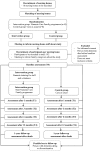Effects of the Namaste Care Family programme on quality of life of nursing home residents with advanced dementia and on family caregiving experiences: study protocol of a cluster-randomised controlled trial
- PMID: 30327407
- PMCID: PMC6196971
- DOI: 10.1136/bmjopen-2018-025411
Effects of the Namaste Care Family programme on quality of life of nursing home residents with advanced dementia and on family caregiving experiences: study protocol of a cluster-randomised controlled trial
Erratum in
-
Correction: Effects of the Namaste Care Family programme on quality of life of nursing home residents with advanced dementia and on family caregiving experiences: study protocol of a cluster-randomised controlled trial.BMJ Open. 2019 Jul 10;9(7):e025411corr1. doi: 10.1136/bmjopen-2018-025411corr1. BMJ Open. 2019. PMID: 31296517 Free PMC article. No abstract available.
Abstract
Introduction: Quality of life of people with advanced dementia living in nursing homes is often suboptimal. Family caregivers can feel frustrated with limited contact with their relatives, which results in visits that are perceived as stressful and not very meaningful. Few psychosocial interventions are specifically developed for people with advanced dementia, and actively involve family caregivers or volunteers. Also, interventions usually stop when it becomes difficult for people to participate. The Namaste Care Family programme aims to increase the quality of life of people with advanced dementia, and improve family caregiving experiences through connecting to people and making them comfortable.
Methods and analysis: Our study will evaluate the effects of the Namaste Care Family programme on quality of life of people with advanced dementia living in nursing homes and family caregiving experiences using a cluster-randomised controlled trial. Longitudinal analyses will be performed taking into account clustering at the nursing home level. Both a cost-effectiveness and a cost-utility analysis from a societal perspective will be performed. We will modify the Namaste Care Family programme to increase family and volunteer involvement in ongoing and end-of-life care. Data collection involves assessments by family caregivers, nursing staff and elderly care physicians using questionnaires, and observations by the researchers at baseline and multiple times over 12 months. The last questionnaire will be sent up to month 24 after the death of the person with dementia. During semistructured interviews, the feasibility, accessibility and sustainability of the Namaste Care Family programme will be assessed.
Ethics and dissemination: The study protocol is approved by the Medical Ethics Review Committee of the VU University Medical Center in Amsterdam (protocol no. 2016.399) and registered with the Nederlands Trial Register (NTR5692). The findings will be disseminated via publications in peer-reviewed journals, conference presentations and presentations for healthcare professionals where appropriate.
Trial registration number: NTR5692.
Keywords: cluster randomized control trial; dementia; family caregivers; namaste care; palliative care; quality of life.
© Author(s) (or their employer(s)) 2018. Re-use permitted under CC BY-NC. No commercial re-use. See rights and permissions. Published by BMJ.
Conflict of interest statement
Competing interests: JS developed the Namaste Care programme and is the author of The end-of-life Namaste Care programme for people with dementia. LV is married to the developer of Namaste Care.
References
Publication types
MeSH terms
Associated data
LinkOut - more resources
Full Text Sources
Medical

